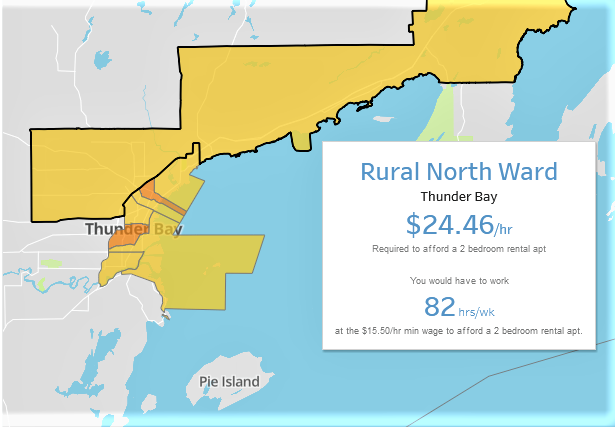
THUNDER BAY — A new housing study indicates affordable housing is out of reach for many Thunder Bay residents, suggesting residents must earn nearly one-and-a-half times the minimum wage to meet a federal housing affordability benchmark.
The study was released earlier this week by the Canadian Centre for Policy Alternatives, a left-leaning think tank.
It calculates what the CCPA calls a “rental wage” — the hourly wage needed to afford rent while working a standard 40-hour week and spending no more than 30 per cent of before-tax income on housing.
That 30 per cent threshold is used by the Canadian Mortgage and Housing Corporation to define affordable housing: If a household spends 30 per cent or more of its income on rent, that housing is not considered affordable.
The CCPA study found Thunder Bay single-income earners need to make at least $22.60 per hour, on average, to afford a two-bedroom apartment without spending over 30 per cent of their income on rent.
Bonnie Krysowaty, a staffer with the Lakehead Social Planning Council who coordinates the Thunder Bay poverty reduction strategy, called those numbers disturbing, if not surprising.
“What’s startling is people have to work 82 hours a week, approximately, at minimum wage to fulfill these financial obligations for housing,” she said.
“Some people are doing that — they’re working two jobs full-time, and it’s leaving no time for good mental health and time for living. And if people aren’t doing that, they’re suffering because they’re not able to meet the social determinants of health.”
In practice, that means many households are unable to pay their bills or meet their food needs after accounting for rent.
“Even going to a movie can be unaffordable to people just because of their housing costs,” Krysowaty said.
She believes Thunder Bay’s rental wage of $22.60 clearly indicates the system isn’t working, even for those working full time at jobs that pay well above minimum wage.
“We really have to question whether or not people in general can pay their bills – we know people on social assistance can’t, we know people earning a minimum wage can’t, and now we’re finding even people earning a ‘living wage’ are finding it tough to do that.”
The CCPA study uses average rental prices for a two-bedroom apartment — the most common type of rental — to calculate the topline “rental wage” for a single-income household.
The study drew on data from the CMHC’s Rental Market Survey, examining 37 census metropolitan areas and 776 neighbourhoods within those CMAs.
An interactive map allows viewers to explore those numbers for themselves.
The tool indicates Thunder Bay’s East End is the most affordable area of the city, with a rental wage of $20.71.
The “College Heights/Grandview/Lakefront” area in the North End was the least affordable, with a rental wage of $27.25.
The Confederation College area was also identified as more expensive, with a rental wage calculated at $25.
About half of Thunder Bay residents own their own home, while half pay rent, according to the social planning council.
Nearly a third of local renters spend more than 30 per cent of their income on housing, according to the agency’s 2022 poverty reduction report.
Only around nine per cent of homeowners spent over 30 per cent of their income on housing.
While the study found Thunder Bay rents to be unaffordable for lower-income residents, the city ranked as the most affordable among Ontario municipalities considered in the study, ahead of Windsor, Sudbury, Brantford, Peterborough, and others.
The Thunder Bay rental wage of $22.60 compare to an Ontario average of $29.90.
CMHC data released earlier this year showed the average rental cost for local apartments increasing as availability tightened, with a vacancy rate of just one per cent for two-bedroom apartments.
That data showed the average rent for a two-bedroom apartment in Thunder Bay rising to $1,175.
The CCPA study suggests governments must intervene to better regulate rental markets, and encourage construction of more housing units, with a focus on rent-controlled and non-market housing.
Krysowaty believes the study also indicates the inadequacy of minimum wage rates, which she called "poverty wages."
https://news.google.com/rss/articles/CBMiXGh0dHBzOi8vd3d3LnRibmV3c3dhdGNoLmNvbS9sb2NhbC1uZXdzL3N0dWR5LXBlZ3MtdGh1bmRlci1iYXlzLXJlbnRhbC13YWdlLWF0LTIyNjBoci03MzAzMTA00gEA?oc=5
2023-07-20 19:39:41Z
2234243059
Tidak ada komentar:
Posting Komentar